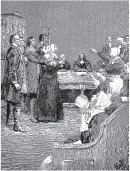Christians can ask God for compassion and discernment
I still remember being quite nervous when I attended my first witchcraft meeting almost 30 years ago. Since I study religions and had already been to Hindu, Buddhist, Muslim, Jewish and New Age groups, I thought a pagan meeting would be a good next step. My wife Gloria told me I was crazy.
It was the regular Sunday evening meeting of The Wiccan Church of Canada. You might think it would have been scheduled at midnight or something, but as I recall it was for 8 p.m. or earlier. Even though it was decades ago, I distinctly remember several details.
At the start of the coven ritual, one of the leaders drew a knife. "Great," I thought. "My wife was right. I am crazy to be here." However, as I quickly realized, there was no physical danger. The worship leader used the athamesymbolically to invite pagan deities to the worship, which included a lot of chanting and some drinking.
Apart from their religion, this group founded by Richard and Tamarra James in 1979 seemed to be normal friendly people.
I’ve observed several pagan events since then (I go to watch, not worship) and have never seen anything remotely criminal. In fact I’ve found most witches subscribe to a do-no-harm rule called the Wiccan Rede, "An ye harm none, do what ye will."
Back in the year 1600, no Christian would have positive words about witches. According to Jeffrey Burton Russell, the famous historian, eight images of witches thoroughly dominated Christian culture from roughly 1300 through 1700 – witches hate Christians, worshi Satan, fly in the night, meet in secret, desecrate the crucifix and Communion, engage in orgies, practise cannibalism and sacrifice children.

Viewable Image - enormous change from persecution
What explains this enormous change from persecution to tolerance? ILLUSTRATION: HOWARD PYLE / EVERETT HISTORICAL
This sinister view led to what witches now call the Burning Times, when those accused of witchcraft were tortured or killed throughout Europe. Americans also prosecuted witches during the Salem witchcraft craze in Massachusetts in 1692. To be sure, there are still isolated cases today of people who claim to be witches (or more commonly Satanists) who go on a killing spree. However, most Christians recognize that modern Western witches are not criminal Satan worshippers.
What explains this enormous change from persecution to tolerance? Partly, the rise of science and serious historical investigation dispelled many wild accusations and laid bare the enormous moral and judicial injustices committed in the false social panic.
Most of today’s witches trace their roots to 20th-century British figures such as Gerald Gardner (and his Book of Shadows), Doreen Valiente, Raymond Buckland and Alex Sanders. There are many factions within Wiccan religion, but simply put most witches are nature-loving polytheists who worship pre-Christian gods and goddesses.
Witches and other pagans celebrate Halloween (the end of harvest season) as the time to honour loved ones who have passed in the previous year. Most witches believe in the supernatural and magic (such as the famous hex against Brett Kavanaugh last October). Many witches believe in reincarnation and karma.
Witchcraft has experienced incredible growth in the last 30 years, due in part to Internet savvy (see www.witchvox.com, for example, with its 4,100 pages) and the influence of popular novels and movies about fictional characters such as Harry Potter and Buffy the Vampire Slayer. Dan Brown, author of The Da Vinci Code, has also popularized a ridiculous theory that Jesus and Mary Magdalene were pagans. Witches are now in every province and state in North America.
This growth makes it increasingly urgent that Christians know how to respond. Starting with accurate information is important. Two helpful books by Christian authors are Witchcraft Goes Mainstream by Brooks Alexander (Harvest House, 2004) and Goddess Worship, Witchcraft and Neo-Paganism by Craig Hawkins (Zondervan, 1998).
Articles on pagan internet sites give evidence that many witches are hurting emotionally, and there is a lot of pagan infighting. There is no better response to those needs than open Christian fellowship that abounds in grace where the Holy Spirit can do His work of healing and pointing to Christ.
The gods and goddesses of paganism are not rooted in history. Zeus, Artemis, Demeter, Aphrodite, Brigid, Freya and so on are mythological, not real. In contrast, Jesus is a figure of history. This is why Paul used the faint light in paganism and Greek philosophy (Acts 17) as a pointer to that story of Jesus that "was not done in a corner" (Acts 26).

James A. Beverley is professor of Christian thought and ethics at Tyndale Seminary in Toronto. Find more of these columns at www.FaithToday.ca/ReligionWatch.